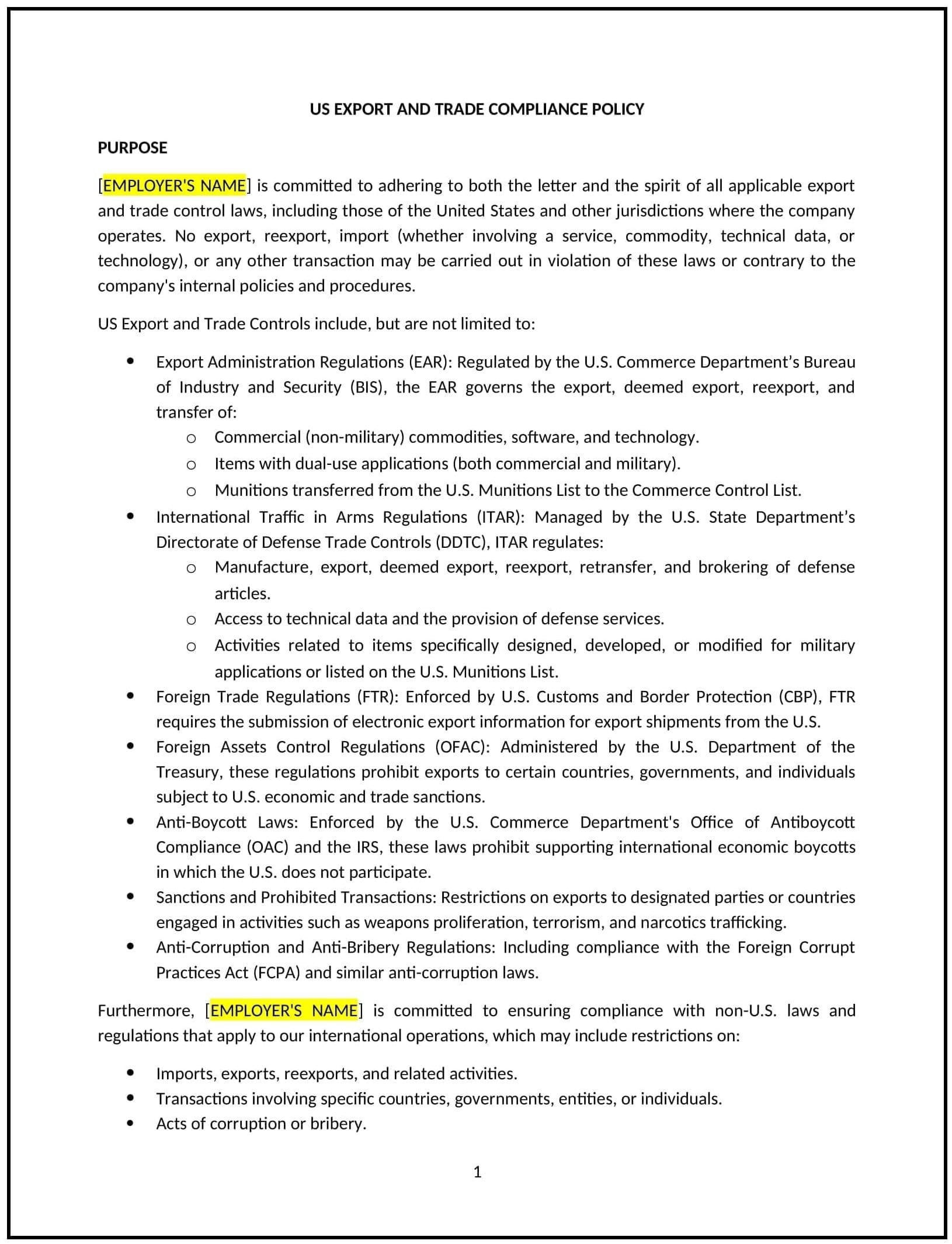US export and trade compliance policy (Montana): Free template
Got contracts to review? While you're here for policies, let Cobrief make contract review effortless—start your free review now.

Customize this template for free
US export and trade compliance policy (Montana)
A US export and trade compliance policy helps Montana businesses navigate and adhere to the regulations governing the export of goods, services, and technologies. This policy outlines the legal requirements for international trade, including licensing, documentation, and restrictions imposed by the US government, as well as best practices for maintaining compliance with export control laws.
By implementing this policy, businesses can reduce the risk of legal violations, ensure smooth international operations, and promote ethical business practices when engaging in global trade.
How to use this US export and trade compliance policy (Montana)
- Define key export regulations: The policy should outline the main US export laws and regulations with which the business must comply, including the Export Administration Regulations (EAR), International Traffic in Arms Regulations (ITAR), and sanctions enforced by the US Department of Treasury's Office of Foreign Assets Control (OFAC).
- Set internal compliance procedures: The policy should specify the internal processes for screening customers, suppliers, and third-party partners, and determining whether their locations or activities require special licenses or approvals for exporting products or services.
- Outline the licensing process: The policy should detail how employees should apply for export licenses when required, including how to submit license applications to relevant government agencies and how to maintain records of licenses granted or denied.
- Clarify restricted parties and end-users: The policy should define restricted parties, including individuals or entities subject to US government sanctions or trade restrictions, and explain the steps employees should take to ensure they do not engage in transactions with prohibited parties.
- Address export documentation: The policy should set guidelines for documenting exports, including invoices, shipping documents, and licenses. It should also specify how records should be maintained to ensure easy access in case of audits or inquiries.
- Ensure employee training: The policy should require regular training for employees involved in international trade, including education on export laws, compliance procedures, and identifying potential risks related to illegal exports.
- Review and update regularly: The policy should be reviewed periodically to ensure it remains aligned with evolving US export laws, international trade practices, and any changes in the business’s operations or markets.
Benefits of using this US export and trade compliance policy (Montana)
This policy provides several key benefits for Montana businesses:
- Reduces legal risks: A clear export and trade compliance policy helps businesses avoid violations of US export laws, which could lead to substantial fines, penalties, or other legal consequences.
- Promotes ethical business practices: The policy ensures that businesses operate in accordance with the law and adhere to ethical standards when conducting international trade.
- Streamlines international operations: A standardized compliance process enables businesses to efficiently manage international transactions, ensuring timely approvals and reducing delays due to legal issues.
- Enhances reputation: By demonstrating a commitment to compliance, businesses can enhance their reputation with clients, suppliers, and regulatory authorities, fostering trust and credibility in global markets.
- Supports smooth audits: By maintaining clear records and documentation of export transactions, businesses can ensure they are prepared for government audits or investigations.
- Mitigates the risk of penalties: By adhering to the export compliance guidelines, businesses can avoid the risk of hefty fines or sanctions that may result from violations.
Tips for using this US export and trade compliance policy (Montana)
- Communicate the policy clearly: Ensure that all employees involved in international trade are aware of the export and trade compliance policy and understand their role in maintaining compliance.
- Train employees regularly: Conduct regular training sessions for employees, particularly those involved in shipping, sales, and procurement, to stay updated on export laws and internal compliance procedures.
- Perform regular screenings: Implement a process for regularly screening customers, suppliers, and third-party partners against restricted party lists to prevent any illegal transactions.
- Keep detailed records: Ensure that all export transactions, documentation, and licenses are accurately recorded and stored for future reference, in case of audits or compliance checks.
- Stay informed about changes: Regularly monitor changes in US export laws, international trade regulations, and any updates from government agencies like the Bureau of Industry and Security (BIS) or OFAC to ensure that the business’s operations remain compliant.
- Review the policy periodically: The policy should be reviewed at least annually to ensure it is up-to-date with the latest export laws, business practices, and regulatory requirements.